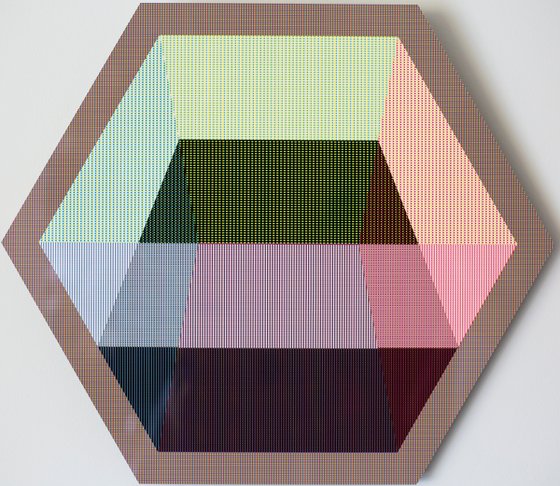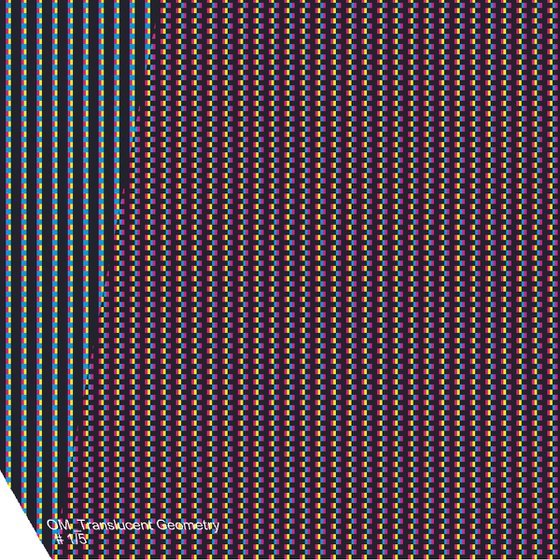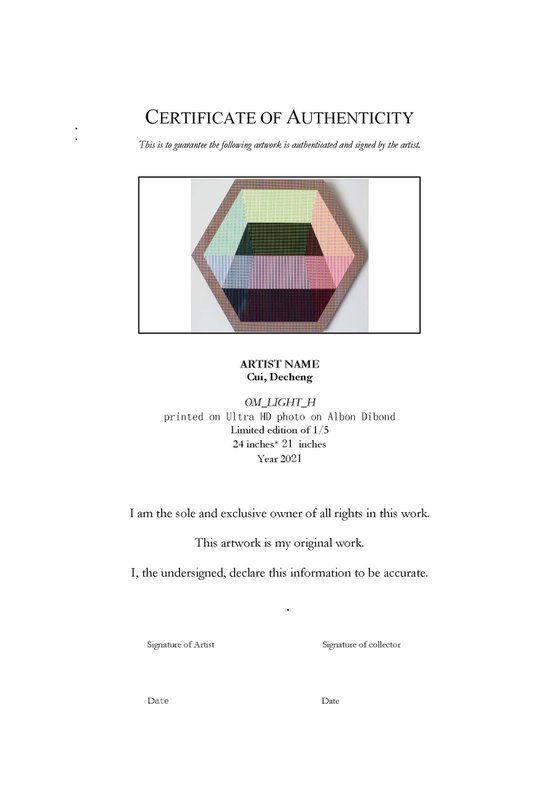- By medium
- By subject
- By budget
- Sales
- Gift cards
- Discover all art
- Artists
- Editors’ picks
- Ideas
Artwork description:
This is a digital artwork, printed by White Wall on an Ultra HD photo of Albon Dibond. This is one of the most professional and highest museum quality printing in the world.
This work only uses the four pure colors of CMYK. I used my own optical color mixing system. All the colors presented in the eyes of the audience are mixed in the audience's visual system.
This artwork belongs to my series of solo exhibition Sensibility and reason.
Sensibility and rationality, one is animal instinct, and the other is regarded as a characteristic of human beings. Sensibility allows us to perceive time and space, and rationality allows us to understand logic and concepts. I call the sensual, concrete, and instinctive consciousness perceptual, and the conceptual, abstract, and reflective consciousness as rationality. Sensibility and rationality are both interlinked and opposed to each other.
Sensibility is the starting point of cognition, and rationality is the guide of sensibility. They depend on each other and are difficult to separate. Direct experience from the senses is an inevitable condition for people to perceive time and space. Obtaining experience through the senses, then shaping the representation through experience, and finally forming a concept through the representation, is the natural way for people to understand the world. If a person jumps over the experience of the senses and directly obtains the concept, it will easily produce a sense of contradiction and understanding deviation. We cannot make a born blind person understand the colorfulness of the world only through the description of words; it is also difficult for us to be sure whether a law that has long been separated from our daily life is fair. Without rational guidance, the senses will only become aimless wanderers. The carrying capacity of consciousness is limited, but the information in this world is unlimited. Reason can mobilize people's attention and produce anticipation, so that the senses can efficiently obtain effective information. Through the study of theory, musicians can capture more subtle melody changes, and artists can also perceive richer color composition. Coordinating the cooperation between sensibility and rationality is a natural talent of everyone, and everyone can combine them consciously or unconsciously.
In today's human civilization built by words, sensibility and rationality often oppose each other as contradictory sides. Today's human worship of words and books is constantly impacting the natural laws of human understanding of the world. Text is the carrier of abstract content, and the content conveyed by it is purely abstract information no matter how concrete it is. The concept established entirely by abstract information from words floats above intuitive experience and is also contrary to the natural laws of human cognition of the world. Contemporary people often encounter this dilemma: when the experience gained from intuition does not match the concept gained from words, they don't know whether to believe in sensibility or rationality. For example, when people face an unheard and fragrant fruit, they sometimes rely on the aroma captured by the sense of smell and instinctively decide to eat it, and sometimes they rely on reason to refuse to taste it, because they judge that it is not in the known edible category. This kind of predicament will also deprive people of their mental security and put themselves in a state of contradiction. Because sensibility and rationality answers are difficult to compare and measure, they have different dimensions and are difficult to put into the same formula. Most of the people in it will adopt the method of favoring the sensibility or the rational side to get a definite answer, and thus escape this contradictory predicament.
If sensibility is regarded as the only truth, then this scientific empire that relies heavily on concepts from concept to concept will be turned into a mirage; if reason is regarded as the only truth, then the uneasiness and misunderstanding in people’s hearts will be superimposed infinitely. Will eventually distort the appearance of the world. Sensibility and rationality, as the only two means for people to perceive the world, although each has its own strengths, they are not perfect. Human beings are not designed to understand the truth of the world. Human beings can only rely on these two incomplete tools of sensibility and rationality to stagger and pursue the truth of this world.
This exhibition is part of my series of solo exhibitions, and also the first part of it. The original intention of this series of exhibitions is to visualize the possibilities and limitations of human cognition of the world. This series of exhibitions consists of four parts: the neutral "sensibility and reason", the "criticism of sensibility" that favors rationality, the "criticism of pure reason" that favors sensibility, and the "human limitations" that criticize both. Sensibility and reason are the most basic topics for discussing consciousness, and they are also the most eternal topics.
Materials used:
printed on Ultra HD photo on Albon Dibond
Tags:
#abstract #contemporary #dark #light #fine art #color #space #illustration #limited edition #conceptual #optical #hexagon #pointillism #print on #gallery artOM_LIGHT_H (2021) Digital Art (Giclée)
by Decheng Cui
2 Artist Reviews
£1,511.3
- Digital Art (Giclée) on Other
- From a limited edition of 5
- Size: 60.96 x 53.34 x 2.54cm (unframed) / 60.96 x 53.34cm (actual image size)
- Ready to hang
- Signed and numbered certificate of authenticity
- Style: Geometric
- Subject: Abstract and non-figurative
- Hurry only 1 left in stock
Loading
Artwork description
This is a digital artwork, printed by White Wall on an Ultra HD photo of Albon Dibond. This is one of the most professional and highest museum quality printing in the world.
This work only uses the four pure colors of CMYK. I used my own optical color mixing system. All the colors presented in the eyes of the audience are mixed in the audience's visual system.
This artwork belongs to my series of solo exhibition Sensibility and reason.
Sensibility and rationality, one is animal instinct, and the other is regarded as a characteristic of human beings. Sensibility allows us to perceive time and space, and rationality allows us to understand logic and concepts. I call the sensual, concrete, and instinctive consciousness perceptual, and the conceptual, abstract, and reflective consciousness as rationality. Sensibility and rationality are both interlinked and opposed to each other.
Sensibility is the starting point of cognition, and rationality is the guide of sensibility. They depend on each other and are difficult to separate. Direct experience from the senses is an inevitable condition for people to perceive time and space. Obtaining experience through the senses, then shaping the representation through experience, and finally forming a concept through the representation, is the natural way for people to understand the world. If a person jumps over the experience of the senses and directly obtains the concept, it will easily produce a sense of contradiction and understanding deviation. We cannot make a born blind person understand the colorfulness of the world only through the description of words; it is also difficult for us to be sure whether a law that has long been separated from our daily life is fair. Without rational guidance, the senses will only become aimless wanderers. The carrying capacity of consciousness is limited, but the information in this world is unlimited. Reason can mobilize people's attention and produce anticipation, so that the senses can efficiently obtain effective information. Through the study of theory, musicians can capture more subtle melody changes, and artists can also perceive richer color composition. Coordinating the cooperation between sensibility and rationality is a natural talent of everyone, and everyone can combine them consciously or unconsciously.
In today's human civilization built by words, sensibility and rationality often oppose each other as contradictory sides. Today's human worship of words and books is constantly impacting the natural laws of human understanding of the world. Text is the carrier of abstract content, and the content conveyed by it is purely abstract information no matter how concrete it is. The concept established entirely by abstract information from words floats above intuitive experience and is also contrary to the natural laws of human cognition of the world. Contemporary people often encounter this dilemma: when the experience gained from intuition does not match the concept gained from words, they don't know whether to believe in sensibility or rationality. For example, when people face an unheard and fragrant fruit, they sometimes rely on the aroma captured by the sense of smell and instinctively decide to eat it, and sometimes they rely on reason to refuse to taste it, because they judge that it is not in the known edible category. This kind of predicament will also deprive people of their mental security and put themselves in a state of contradiction. Because sensibility and rationality answers are difficult to compare and measure, they have different dimensions and are difficult to put into the same formula. Most of the people in it will adopt the method of favoring the sensibility or the rational side to get a definite answer, and thus escape this contradictory predicament.
If sensibility is regarded as the only truth, then this scientific empire that relies heavily on concepts from concept to concept will be turned into a mirage; if reason is regarded as the only truth, then the uneasiness and misunderstanding in people’s hearts will be superimposed infinitely. Will eventually distort the appearance of the world. Sensibility and rationality, as the only two means for people to perceive the world, although each has its own strengths, they are not perfect. Human beings are not designed to understand the truth of the world. Human beings can only rely on these two incomplete tools of sensibility and rationality to stagger and pursue the truth of this world.
This exhibition is part of my series of solo exhibitions, and also the first part of it. The original intention of this series of exhibitions is to visualize the possibilities and limitations of human cognition of the world. This series of exhibitions consists of four parts: the neutral "sensibility and reason", the "criticism of sensibility" that favors rationality, the "criticism of pure reason" that favors sensibility, and the "human limitations" that criticize both. Sensibility and reason are the most basic topics for discussing consciousness, and they are also the most eternal topics.
Materials used:
printed on Ultra HD photo on Albon Dibond
Tags:
#abstract #contemporary #dark #light #fine art #color #space #illustration #limited edition #conceptual #optical #hexagon #pointillism #print on #gallery art14 day money back guaranteeLearn more




